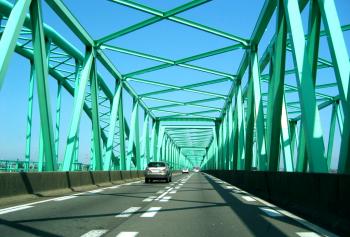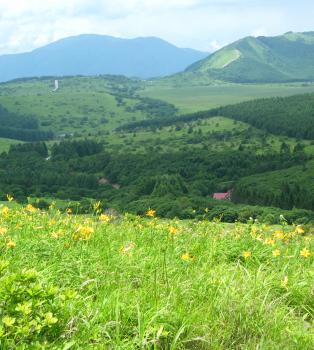I’ve never seen anyone hitchhiking in Japan. Maybe it’s because most people own a car or motorbike, and those that don’t rely instead on the fantastically efficient train and bus services.
I was curious though. Curious to see if it would work. And I soon discovered that the country is something of a hitchhiker’s paradise – especially if you hail from outside of Japan.

Despite the Japanese not having a tradition of hitchhiking, most people know basically what it entails and, judging by a recent trip I made around the south-western island of Kyushu, they’re more than happy to stop for you. Of the nine lifts my friend Paddy and I took on our week-long trip, the longest our thumbs were exposed to the elements for was a mere ten minutes.
Somehow it seemed too easy here, like fishing at a trout farm. Weren’t we meant to be standing by the roadside for at least an hour? Weren’t we supposed to give up and take a bus?
We began our journey in Oita, a city on the eastern side of Kyushu. We walked out toward the edge of the city, put our bags down and our thumbs up. Within just a few minutes we were picking up our bags again after a young guy pulled over in a little Nissan Micra. Hardly believing our luck, we jumped in.
It quickly became apparent that our Japanese language ability was as ropey as Hiroshi’s English, but with our maps, smiles, and enthusiastic gesticulations, we seemed to reach a certain level of understanding. Or so we thought.
You see, we soon realized that he hadn’t quite got the hang of this hitchhiking malarkey, as it was clear he was deviating from his original route. We tried to explain that the idea of hitchhiking was for the driver to take the hitchers as close to their destination as possible without the driver going out of his way. He was, however, determined to head away from wherever he was going in order to get us to wherever we were going. Such generous gestures were to be repeated throughout the week.
After exchanging small talk along the way and singing some Beatles songs together, we arrived safely at our destination and bade Hiroshi farewell. Off he drove into the sunset – back the way he came.
Each lift we got during that week was like a little adventure in itself. The Japanese are a discreet people – they notice Westerners but rarely stare, even in the deepest countryside where we’re about as common as California roll. But judging by the speed at which they stop and offer lifts, they’re certainly curious.

We saw one man in a clapped-out van give us a long look as he drove by. A minute later my attention was drawn by the sound of a vehicle careering along at high speed in reverse gear. I turned around to see the same guy pulling up beside us, winding the window down.
A few miles down the road, Yuji got on the phone to his wife. His driving was scary enough with both hands on the wheel, but now that he only had one, I was beginning to sweat a little. Then, with no eyes on the road, he turned to speak to us. “You stay. Hello family. My house.” We hadn’t booked any place to stay that night so Paddy and I agreed to take up the friendly offer, allowing Yuji to get back to the important job of looking where he was going.
“My house. Falling down,” Yuji said several times as we drove deeper and deeper into the Kyushu countryside. I put his words down to typical Japanese modesty but when we pulled up outside, I could see that it’d been nothing of the sort. It really was falling down. There was more than one hole in the roof together with some sizable cracks in the outside walls.
Yuji’s wife and their three young children dashed out to greet us before hustling us into their
falling-down house. While the mother busied herself in the kitchen, Yuji produced a bottle of sake and poured us both a large cup. The sake was as tasty as the food the mother brought us, and before long our bellies were bursting and we more than a little sozzled.
It was at this point that I was distracted by something unpleasant. There was a rather challenging odour wafting through the house, the source of which I managed to ascertain on my visit to the toilet. Japan is famous for toilets decked out with space-age control panels offering a variety of fancy functions – seat warmers; jet sprays; bottom cleaners; bottom dryers. This toilet was about as far from technology as you could get. There wasn’t any. It was a squat toilet with a hole in the usual place, but everything emptied into a giant tank. To flush everything away, you had to use the bucket of water resting in the corner. It was hard to believe I was in a country known the world over for its hi-tech gadgetry.
Two bottles of sake later, Yuji picked up the phone and said, “You phone home.” Despite my protestations, on the basis of the cost and the fact that my mother might start worrying if I was to tell her that I was staying the night in the house of a stranger that’d picked me up just two hours before, Yuji insisted. Thinking I might cause offense if I continued to refuse, I took the phone and made the call.
After speaking to my mother and telling her how I’d ended up where I was, she became, as I’d expected, worried. Her anxiety levels were ratcheted up by Yuji who, excited by the chance to speak to another Westerner, wrestled the phone from me and began bellowing down the line, “Trevy. Mummy. Happy.” It seemed that in a flash his English vocabulary of 25 words had plummeted spectacularly to just three.
Sleeping at Yuji’s house wasn’t as straightforward as I’d hoped. As the moonlight shone in through one of the holes in the roof, I could hear the unmistakable sound of mosquitoes buzzing about my ears. This wasn’t altogether a surprise as just before I’d turned the light out, I’d noticed that the mosquito screens on the windows had, just like the roof, a number of holes in them. Needless to say, I didn’t sleep well. It’s not easy when insects are eating your face.
The next day, after a bleary-eyed breakfast, Paddy and I packed our things and got ready to leave. Yuji wanted to drive us to the next town 50 miles away, but we felt it’d be taking advantage and so politely declined his offer. Instead he drove us to a nearby main road and within five minutes we were in another car.
This time a middle-aged woman picked us up. I pondered for a moment and marveled at her trusting attitude, as well as the relative safety of Japanese society. Back home, I couldn’t imagine a woman driving by herself stopping for two male travelers.
As with previous drivers, Kumiko deviated from her intended path in order to get us closer to our destination, but after a little while, she became lost. We stopped at one of the ubiquitous convenience stores where she asked a passer-by for directions. The passer-by wasn’t sure and called over another person. Within a few minutes there were six people gathered around the car discussing the best way to get to where we wanted to go. In true Japanese style, a consensus was reached, Kumiko bowed in gratitude at her advisers and we were soon on our way again.
Two days and several lifts later, on a ferry from Kumamoto to Nagasaki, Paddy and I walked about the passengers’ lounge with a notice written in Japanese (by an earlier driver) requesting a lift to the center of Nagasaki. Again, in only a few minutes, one of the passengers raised a hand, gave us a warm smile and offered us a lift.
On second thoughts, maybe the reason I’ve never seen anyone hitchhiking in Japan is because people get picked up so quickly.
If you’re ever in the country and feel like an adventure, consider giving it a go. You never know, you might even get invited to stay in a falling-down house.